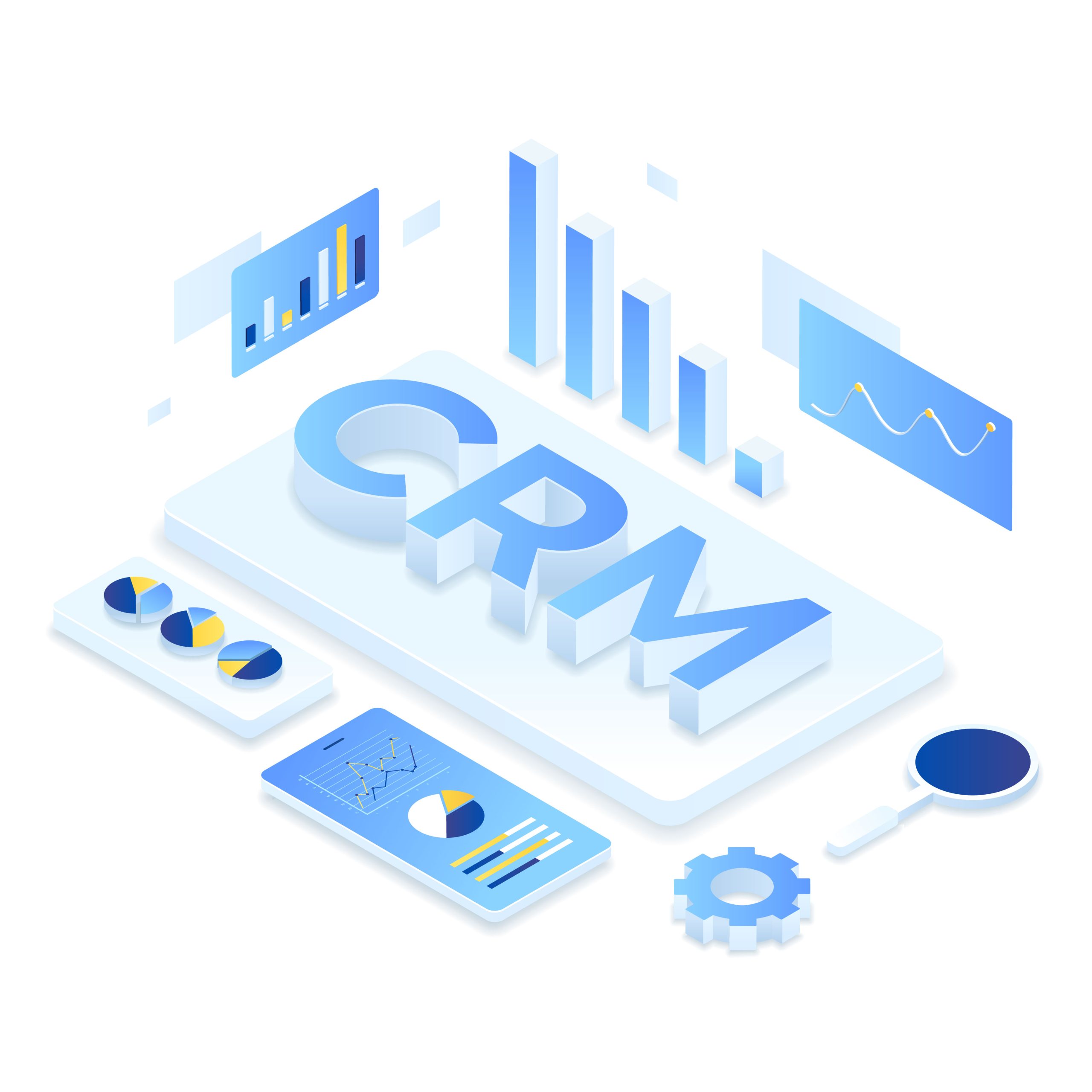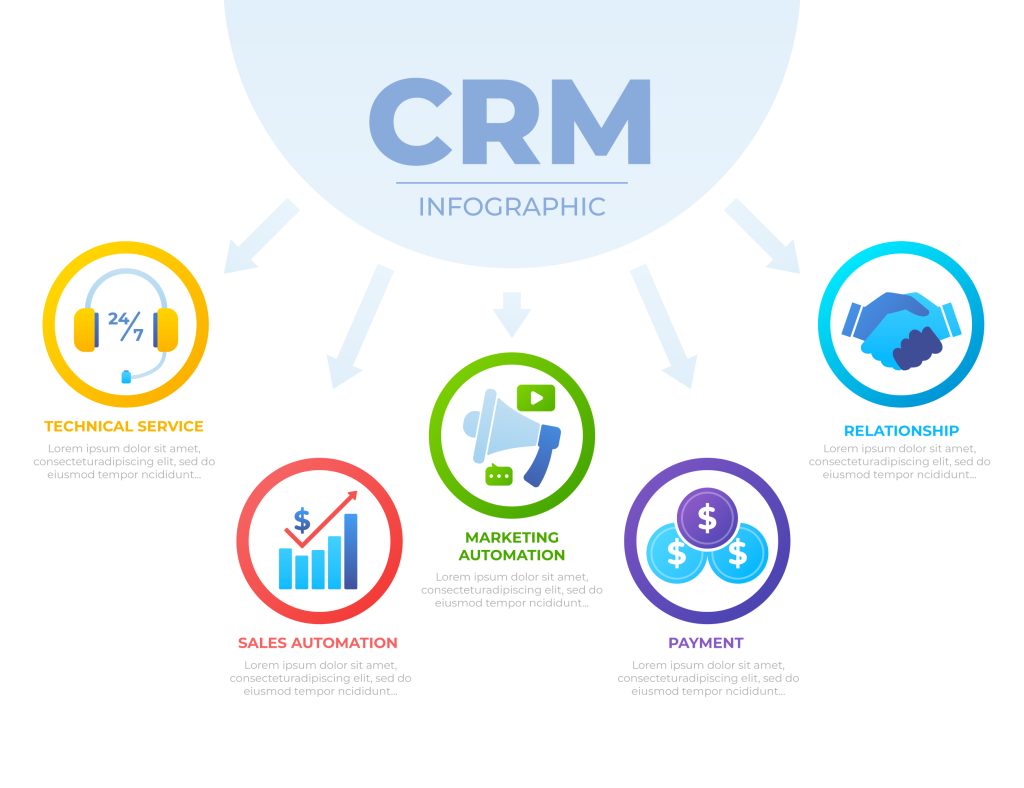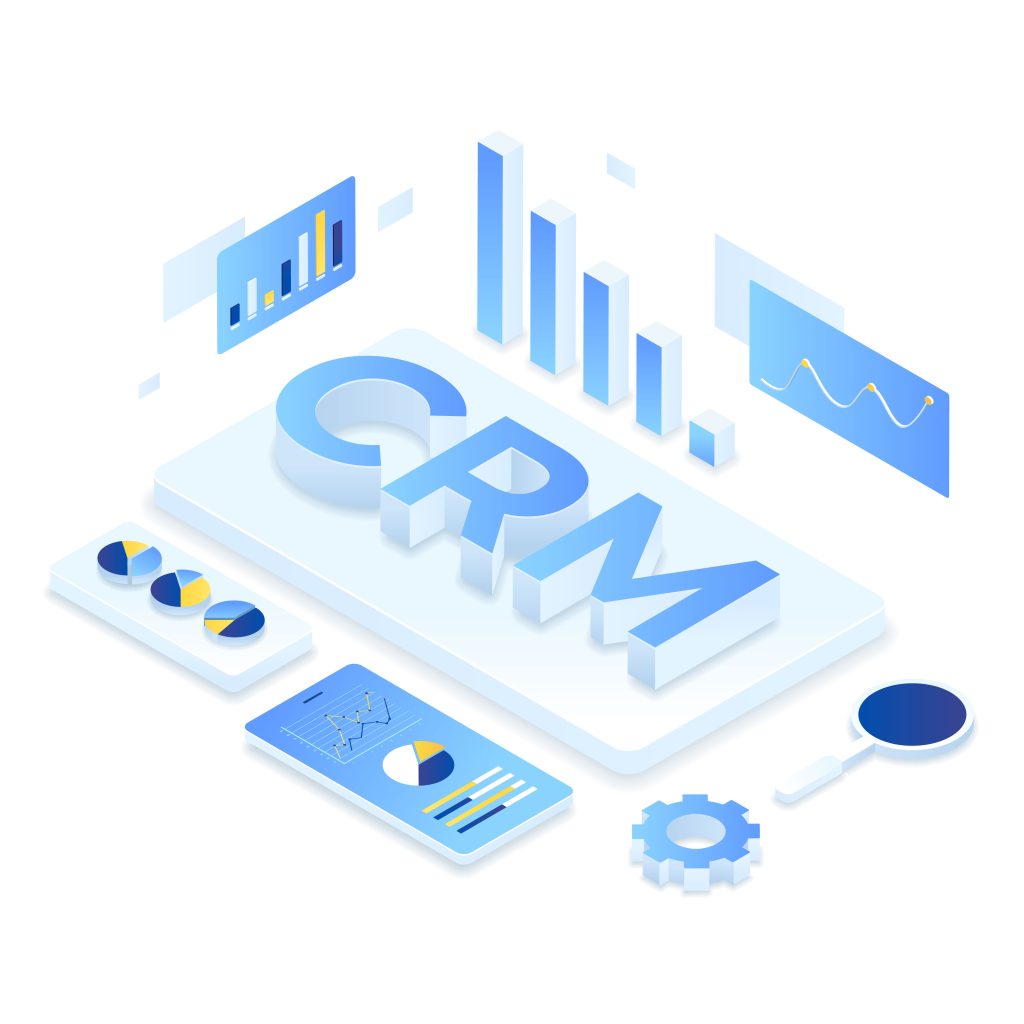Top 5 CRM Platforms for 2025: A Comprehensive Comparison

In today’s business landscape, Customer Relationship Management (CRM) systems are essential for success. With rapid advancements in technology, choosing the right CRM platform can significantly impact your business’s growth. As we approach 2025, it’s important to identify which CRM platforms are emerging as leaders. In this blog, for examples, we will explore the top 5 CRM platforms that are poised to dominate in 2025. Prepare for a detailed overview of powerful tools designed to enhance customer connections and maximize your business potential.
Overview of CRM Platforms for 2025

In the fast-paced business landscape of 2025, effective customer relationship management (CRM) is a game changer. It’s not just about managing contacts anymore; it’s about cultivating relationships, enhancing customer experiences, and ultimately driving business growth. With a variety of CRM solutions available, selecting the right platform for your business is crucial. Let’s delve into why choosing wisely is essential and what features you should focus on.
Importance of Choosing the Right CRM
In this case, selecting the right CRM platform can significantly impact your business’s success. A good CRM system streamlines communication and collaboration, personalizes customer interactions, and provides insights into consumer behavior. These factors are critical for maintaining a competitive edge.
A suitable CRM also boosts sales efficiency by automating routine tasks and providing valuable data analytics. This automation frees up time for your team to focus on what truly matters—building relationships with clients. Additionally, the right CRM scales as your company grows, ensuring that your business can adapt to changing needs and market dynamics.
Key Features to Consider
When evaluating CRM platforms, several key features should be prioritized:
– User-Friendly Interface: Intuitive design ensures that your team spends less time on training and more on driving results.
– Customization: The ability to tailor the CRM to meet your specific business processes is invaluable.
– Integration Capabilities: A CRM must seamlessly integrate with other tools and software in your existing ecosystem.
– Automation Tools: Look for CRMs that automate workflows, such as follow-ups, reminders, and data entry.
– Analytics and Reporting: Robust reporting features provide insights that inform strategic decisions.
– Mobile Accessibility: Mobile-friendly solutions allow your team to work efficiently from anywhere.
Now let’s take a closer look at one of the giants in the CRM landscape: Salesforce.
Salesforce
When it comes to CRM platforms, Salesforce remains a leader in the industry. It’s famous for its extensive features and powerful integrations, Salesforce sets the benchmark for what a comprehensive CRM solution should be. Let’s explore the standout attributes of this impressive platform.
Features and Usability
Salesforce is renowned for its expansive range of features, accommodating businesses of all sizes and industries. At its core, Salesforce offers advanced contact management capabilities, complete with AI-driven insights. These features allow companies to track customer interactions and gain a comprehensive understanding of client needs.
Importantly, one key feature is Salesforce’s cloud-based architecture, which ensures users can access their CRM data anytime, anywhere. This flexibility is further augmented by an intuitive mobile app, keeping your team connected on the go.
Besides, another highlight of Salesforce is its customization potential. With the ability to develop custom applications on its platform, businesses can create a tailored CRM experience that aligns with unique operational requirements. Its comprehensive AppExchange marketplace offers numerous third-party integrations, further increasing its versatility.
Salesforce is powered by Einstein AI, which transforms data into actionable insights. Obviously, this powerful AI engine predicts customer behaviors and suggests next-best actions, enhancing decision-making and boosting sales performance.
Pricing and Packages
Salesforce offers several pricing plans tailored to different business needs:
– Essentials: Ideal for small teams, offering basic CRM functionalities at an affordable rate.
– Professional: Suitable for growing businesses, includes advanced CRM features and unlimited customization options.
– Enterprise: Designed for large businesses requiring comprehensive CRM capabilities and extended integration options.
– Unlimited: Provides premium support, additional storage, and advanced analytics features for enterprises needing top-tier solutions.
Salesforce pricing is subscription-based, with costs increasing alongside the feature set.
Pros and Cons
Pros:
– Comprehensive Features: Salesforce’s extensive suite of features meets the diverse needs of businesses across industries.
– Customization and Integrations: Offers unparalleled customization with thousands of integrations to choose from.
– Scalability: Easily scales with your business as it grows, ensuring continued relevancy.
– Mobile Capabilities: A robust mobile app keeps your team connected and productive, regardless of location.
– AI and Analytics: Einstein AI provides advanced insights that enhance decision-making processes and sales strategies.
Cons:
– Complexity: With so many features, Salesforce can be complex for first-time users. A steep learning curve might initially hinder quick adoption.
– Cost: With premium plans and additional services, Salesforce can become pricey, especially for smaller businesses.
– Customization Needs: While customization is a strength, it requires skilled personnel who can effectively manage and develop on the Salesforce platform.
Understanding Salesforce’s offerings and evaluating how its features align with specific business objectives is essential. Carefully weigh these factors against your company’s priorities before making a decision. In the next sections, we will explore other top CRM platforms aligning with diverse business needs like Zoho CRM, monday.com, Pipedrive, and Creatio. Stay tuned to figure out which CRM platform might be your perfect match!
Zoho CRM
Features and Usability
Zoho CRM is a powerful tool, beloved by businesses of all sizes for its versatility and user-friendly design. A standout feature of Zoho CRM is its intuitive interface, which allows users to navigate through various functionalities with ease. Whether you’re managing leads, opportunities, or accounts, Zoho makes tracking customer interactions a breeze.
Key Features:
– AI-Powered Sales Assistant (Zia): Zoho’s AI, Zia, can predict trends, offer insights, and even interpret your sales data. This feature helps you to be proactive rather than reactive in your sales strategy.
– Multichannel Communication: Connect with customers through email, telephone, live chat, and social media channels within a single platform.
– Customization: Zoho provides the flexibility to customize dashboards, modules, and even automate workflows without any coding expertise.
– Integration: Seamlessly integrates with other Zoho apps and third-party applications, ensuring that all your business processes are streamlined.
– Analytics: With advanced reporting tools, Zoho CRM provides in-depth insights into sales performance, allowing businesses to make data-driven decisions.
Usability is at the heart of Zoho CRM. The platform’s layout is clean and straightforward, making it accessible for users who might not be tech-savvy. Its drag-and-drop functionality adds to the ease of customization, allowing users to configure their settings to meet specific business needs quickly.
Pricing and Packages
Zoho CRM’s pricing structure is designed to be competitive and scalable. It offers tiers that cater to the smallest startups to large enterprises:
– Free Plan: Zoho CRM offers a free tier that supports up to three users, ideal for small teams just starting out.
– Standard Plan ($14/user/month): Provides core CRM functionalities, perfect for small to medium businesses.
– Professional Plan ($23/user/month): Adds features like inventory management, macros, and secure login, boosting efficiency.
– Enterprise Plan ($40/user/month): Offers advanced customization, AI, and multichannel management—ideal for growing businesses.
– Ultimate Edition ($52/user/month): This package includes advanced BI tools and enhanced AI capabilities, aimed at large enterprises looking for extensive analytics and efficiency improvements.
Zoho CRM’s flexibility in pricing ensures that businesses can find a package that fits both their budget and functionality requirements.
Pros and Cons
Pros:
– Comprehensive Features: From communication to analytics, Zoho CRM is packed with powerful tools that meet a wide range of needs.
– Affordability: The lower pricing tiers include essential CRM features, making it accessible for smaller businesses.
– Customization: Zoho’s high level of configurability allows businesses to tailor the CRM to suit their specific operations and processes.
– Free Plan Availability: Offers a free version to help startups and small businesses get started without a heavy financial burden.
Cons:
– Learning Curve: While user-friendly, the extensive features might overwhelm new users without prior CRM experience.
– Email Limitation: Lower-tier plans face restrictions on the number of emails that can be sent per day, which may not suit very active sales teams.
– Technical Support: Some users have reported challenges with Zoho’s customer support, particularly when needing detailed technical assistance.
monday.com
Features and Usability
monday.com is popularly known for transforming traditional workflows with its visual platform, making task and project management enjoyable and effective. Although primarily seen as a project management tool, its CRM capabilities have grown significantly to meet various business needs.
Key Features:
– Visual Sales Pipeline: Track your sales process visually with boards that can be configured to show leads at different stages.
– Automation: Simplify recurring tasks like sending emails, setting reminders, or updating boards with robust automation features.
– Dashboards: Generate custom dashboards to gain insights into sales performance and team productivity at a glance.
– Collaboration Tools: Facilitate team collaboration through shared boards, updates, and comments, effectively reducing email traffic.
– Integrations: Easily integrates with a wide range of essential third-party applications such as Slack, Zoom, and Microsoft Teams to create a cohesive work environment.
Usability is where monday.com truly shines. With its visually engaging boards, the platform transforms data into colorful, understandable grids that are fully customizable. Moreover, users can tailor boards to their exact specifications, ensuring the software fits seamlessly into their workflows.
Pricing and Packages
Moreover, monday.com provides flexible pricing plans that accommodate teams of all sizes. Each package supports unlimited viewers, which can be a cost-efficient solution for larger teams that require collaboration without active input from all members:
– Individual Plan (Free): Includes essential features for up to 2 seats, perfect for personal use or trying out the platform.
– Basic Plan ($10/user/month): Offers an unlimited number of boards and 200+ templates for starting small teams.
– Standard Plan ($12/user/month): Most popular. Includes timeline & Gantt views, guest access, and integrations.
– Pro Plan ($20/user/month): Offers time tracking, charts, and private boards for larger teams needing more functionality.
– Enterprise Plan (Contact for Pricing): Offers enhanced security features and advanced reporting, ideal for larger organizations looking for tailored solutions.
monday.com’s diverse pricing options make it a practical and scalable solution for enterprises as they grow and evolve.
Pros and Cons
Pros:
– Engaging Interface: The visual appeal makes it easier to manage and interpret data, keeping users engaged.
– Easy Customization: Every part of monday.com can be configured to suit individual preferences and team needs.
– Seamless Collaboration: Teams can share updates and comments directly on the board, enhancing communication and reducing reliance on external emails.
– Automation Efficiency: Automation tools save time by handling routine tasks, letting teams focus on more strategic work.
Cons:
– CRM Features: While improving, its core strength lies in project management, which may leave room for improvement in CRM-specific capabilities.
– Pricing Structure: While feature-rich, monday.com can get relatively pricey, especially for larger teams with complex needs.
– Complexity in Setup: Setting up complex workflows and understanding some advanced features may take time and potential consultation with monday.com’s support or learning resources.
In summary, Zoho CRM and monday.com both present robust solutions tailored to diverse business demands. While Zoho CRM is traditionally seen as more feature-heavy for CRM needs, monday.com offers a fresh perspective with its visual and collaborative approach to managing sales and customer relationships. Both platforms promise to equip businesses with the tools they need to thrive and conquer the customer relationship management needs of 2025.
Pipedrive
Pipedrive is a sales-centric CRM platform renowned for its intuitive design and ease of use. Its development was spearheaded by salespeople aiming to create a tool that streamlines the sales process, ultimately benefiting anyone in this fast-paced field.
Features and Usability
For example, Pipedrive focuses on visualizing your sales process and offers a flexible pipeline management structure. Here are some standout features and usability aspects:
– Pipeline Customization: Tailor your pipeline stages to match your unique sales process, allowing you to visualize where each prospect stands in the sales journey.
– Activity Tracking: Assure that no lead is ever neglected with automated activity notifications and reminders.
– Email Integration: Seamlessly integrate your email accounts, synchronizing sent and received emails directly within the CRM.
– Mobile App: Stay on top of your deals anywhere, anytime with a robust mobile application on Android and iOS.
– Goal Setting and Reporting: Define sales targets and monitor progress through customized reporting dashboards, enabling enhanced strategic planning.
Usability is one of Pipedrive’s strongest suits. It’s designed to be intuitive, allowing users with even the most basic tech knowledge to navigate with ease. Its drag-and-drop feature for moving deals along the pipeline enhances user experience significantly.
Pricing and Packages
Importantly, Pipedrive offers four pricing tiers that cater to different business needs:
1. Essential: At $14.90 per user/month (billed annually), this package offers basic pipeline and sales management features ideal for small teams.
2. Advanced: Costing $24.90 per user/month (billed annually), it includes additional features like full email sync with templates and open and click tracking.
3. Professional: For $49.90 per user/month (billed annually), users get access to advanced features such as revenue forecasting, sales insights, and complete email synchronization.
4. Enterprise: At $99 per user/month (billed annually), this package provides enhanced security, unlimited reporting options, and dedicated customer support.
In fact, the scalability offered by Pipedrive makes it quite appealing to growing businesses that anticipate evolving CRM needs.
Pros and Cons
Pros:
– User-Friendly Interface: Its simplistic design simplifies the onboarding process for new users.
– Excellent for Sales Teams: Tailored for sales professionals, it efficiently manages and tracks sales activities.
– Strong Customization Options: Allows significant customization to fit varied business processes.
Cons:
– Limited Non-Sales Features: The focus is heavily on sales, with fewer tools for marketing and customer service management.
– Basic Reporting Features in Lower Tiers: Advanced reporting features are exclusive to higher-tier plans, which could limit smaller businesses with restricted budgets.
Creatio

Obviously, Creatio stands out in the crowd by offering a unique blend of Customer Relationship Management along with Business Process Management, all under a unified, no-code platform. This extends its flexibility and automation capabilities to an unparalleled level.
Features and Usability
Creatio provides a wide range of features emphasizing process automation and customization:
– 360-Degree Customer View: Access to comprehensive customer insights allows businesses to create a more personalized customer experience.
– No-Code Customization: Easily design unique applications with drag-and-drop tools, making tailor-made solutions accessible without extensive coding knowledge.
– Automated Business Processes: Automate routine tasks with process automation capabilities, boosting efficiency and freeing up valuable time for more pressing tasks.
– Advanced Analytics: Leverage cutting-edge analytics to forecast trends, analyze performance, and drive data-backed decisions.
– Omnichannel Communication: Seamlessly interact with customers across all channels, ensuring a consistent and cohesive customer experience.
Overall, the platform’s usability is enhanced by its focus on automation, allowing users to initiate complex workflows with minimal effort. This feature is particularly beneficial for enterprises seeking to streamline multiple operations under one roof.
Pricing and Packages
For example, Creatio CRM offers different pricing levels tailored to specific business requirements:
1. Team: Pricing starts at approximately $30 per user/month and is tailored for smaller teams or departments seeking streamlined collaboration with essential CRM functionalities.
2. Commerce: This package is geared towards small to medium-sized businesses, offering medium-tier functionalities. The price ranges depending on custom needs and configurations.
3. Enterprise: Designed for larger enterprises requiring full-scale access to CRM, BPM, and process automation capabilities. Pricing is customized based on specific business needs.
In summary, Creatio’s pricing model is often seen as flexible and business-oriented, allowing organizations to tailor their spending to their actual use without overcommitting financially.
Pros and Cons
Pros:
– Highly Customizable: The no-code platform enables businesses to design bespoke applications and workflows without needing an IT background.
– Powerful Process Automation: Creatio’s capability to automate myriad processes truly enhances any CRM strategy focused on efficiency.
– Integrated BPM: The BPM element integrates seamlessly, offering a holistic view of business operations beyond mere customer management.
Cons:
– Steeper Learning Curve: The extensive customization options might be overwhelming for users with no prior process automation experience.
– Higher Entry-Level Pricing: For startups and small businesses, the initial cost might be a stretching point, although justified by its capabilities.
With its powerful features and extensive customization capabilities, Creatio is especially beneficial for businesses eager to embrace both CRM and BPM in a unified platform. Companies dedicated to high levels of automation and customization will find that Creatio positions them strategically for future scalability and success.
Table of Comparison
Here’s a Google Docs–compatible comparison table of the CRM platforms you mentioned, designed for copy-paste with clear formatting:
? CRM Platform Comparison Table
| Feature / Platform | Salesforce | Zoho CRM | monday.com | Pipedrive | Creatio |
|---|---|---|---|---|---|
| Best For | Large enterprises, complex sales processes | Small to mid-sized businesses, price-conscious | Project-based teams, task tracking | SMBs focused on sales pipelines | Businesses needing advanced workflow automation |
| Ease of Use | Moderate – steep learning curve | Easy to moderate | Very easy | Very easy | Moderate |
| Customization | Very high (extensive with Apex and Lightning) | High (with scripting and drag-and-drop editor) | Moderate (via automation recipes) | Moderate (custom fields, workflows) | High (low-code/no-code tools) |
| Automation | Advanced process automation & AI | Workflow automation, Blueprint builder | Workflow automations for tasks & deals | Workflow automation (deal-centric) | Strong BPM engine and case management |
| Integrations | Thousands via AppExchange, APIs | Many native + Zapier, custom integrations | Native apps, APIs, Zapier | Native integrations + Zapier | Open API, native + marketplace integrations |
| Reporting & Analytics | Powerful, customizable dashboards | Standard + advanced with add-ons | Visual dashboards, less advanced reporting | Pipeline and sales-focused reports | Advanced dashboards and AI insights |
| Mobile App | Full-featured | Full-featured | Task- and board-focused | Full-featured | Full-featured |
| Pricing | Higher – starts at $25/user/month (Essentials) | Affordable – from $14/user/month | From $10/user/month | From $14.90/user/month | Mid-range – starts around $25/user/month |
| Free Trial | Yes | Yes | Yes | Yes | Yes |
| Standout Feature | Enterprise-grade scalability & ecosystem | Great value for money + customization | CRM + project/task management combo | Sales-focused UX + simplicity | Low-code automation and unified CRM processes |
You might also be interested Understanding CRM Earnings Dates: Key Timelines and Their Importance



